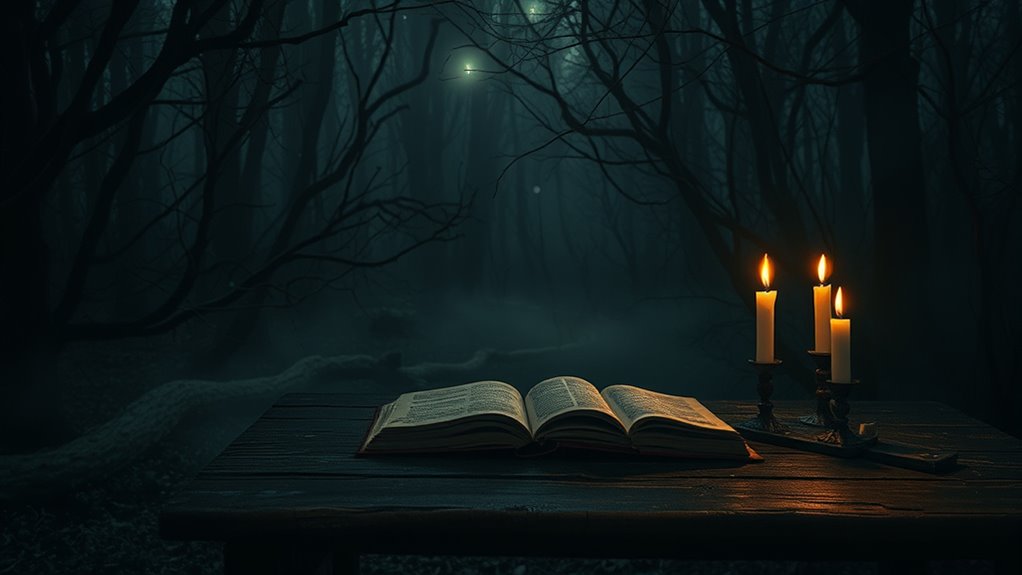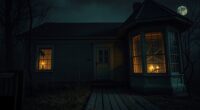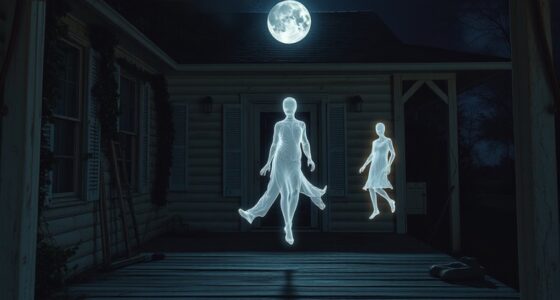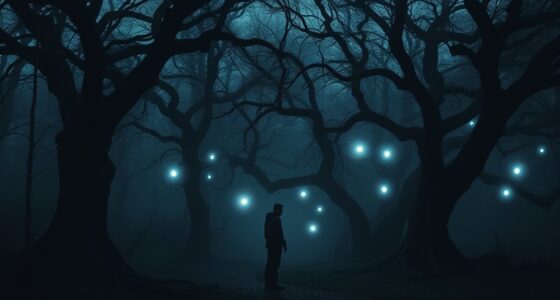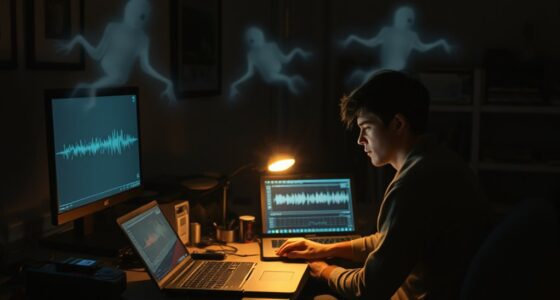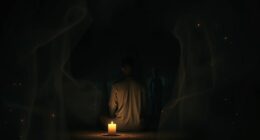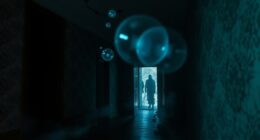When asked about the paranormal, many people trust personal experiences and cultural backgrounds over scientific explanations. Some believe in ghost sightings, psychic abilities, or other supernatural events, often citing vivid dreams or unexplained sensations as proof. Others remain skeptics, attributing these experiences to illusions, brain chemistry, or coincidence. Your perspective is shaped by what you’ve encountered and what you believe is possible. If you’re curious, you’ll find more insights into how perceptions and beliefs influence our view of the unknown.
Key Takeaways
- Many believe paranormal sightings are genuine experiences linked to spirits, while skeptics attribute them to natural phenomena or psychological factors.
- Cultural background and personal beliefs significantly influence how individuals interpret paranormal encounters.
- Personal experiences, such as vivid dreams or sensing emotions, strongly reinforce belief in the supernatural for many respondents.
- Scientific explanations for paranormal phenomena remain inconclusive, leading to diverse opinions based on individual evidence and biases.
- Surveys reveal a wide range of beliefs, with some perceiving paranormal activity as real and others viewing it as misinterpretation or illusion.
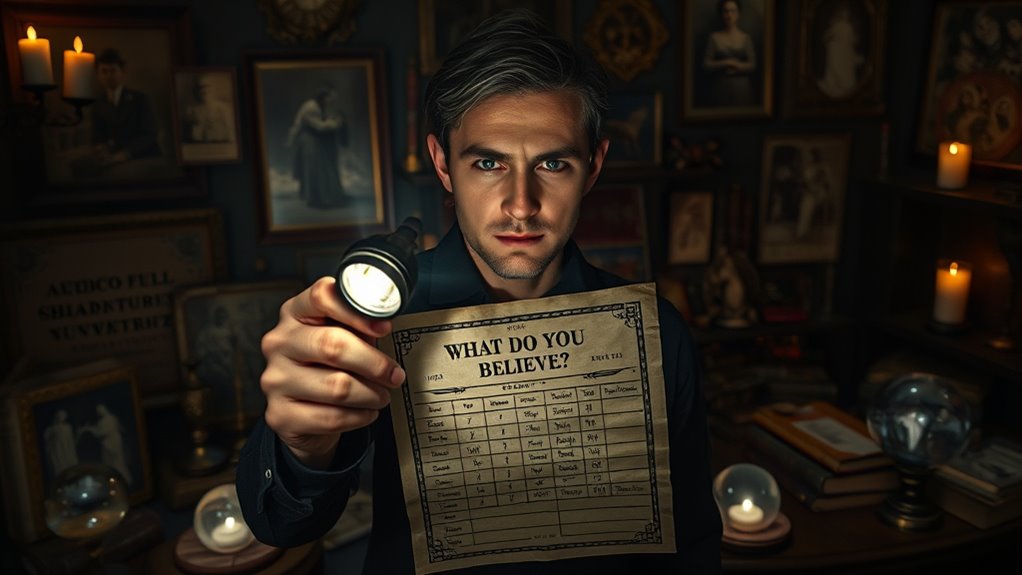
Have you ever wondered what our audience truly believes about the paranormal? It’s a question that sparks curiosity and debate, and many people have strong opinions based on personal experiences or cultural influences. When we ask about ghost sightings, some claim to have seen apparitions that defy logical explanation, while others dismiss these stories as tricks of the mind or misinterpretations of natural phenomena. Similarly, psychic experiences resonate differently with individuals—some swear by their ability to predict events or sense unseen energies, while skeptics question the validity of such claims altogether. Understanding what people believe isn’t just about collecting stories; it’s about grasping the underlying reasons behind those beliefs.
You might find that many of our audience members have had firsthand encounters that they interpret as ghost sightings. For some, these sightings are fleeting glimpses of figures in the corner of their eye, while others are convinced they’ve seen full-bodied apparitions that linger before vanishing. These experiences often leave a deep impression, shaping their beliefs about the existence of spirits and the afterlife. For many, ghost sightings aren’t just about fear—they’re about connection or closure, a way to communicate with loved ones who have passed on. On the other hand, some people remain skeptical, attributing such sightings to sleep paralysis, hallucinations, or even chemical reactions in the brain. Additionally, the ambiguous nature of visual perception can influence how individuals interpret these mysterious experiences, making it difficult to separate genuine encounters from illusions. Moreover, cultural background and personal beliefs can heavily influence how these experiences are perceived and interpreted. Cognitive biases can also play a role in shaping perceptions of paranormal events, making some experiences seem more convincing than others.
Psychic experiences also feature prominently in our audience’s beliefs. Some individuals report having vivid dreams that later come true or sensing the emotions of others without any apparent reason. These experiences often reinforce their faith in a world beyond the physical, where intuition and unseen energies play vital roles. Others, however, see psychic phenomena as coincidence or wishful thinking, challenging the idea that we can truly tap into supernatural abilities. What’s fascinating is how personal these beliefs are—what one person considers a genuine psychic experience might be dismissed by another as coincidence or imagination. Personal experiences often serve as powerful evidence for believers, even when scientific explanations remain elusive.
Frequently Asked Questions
How Do Skeptics Interpret Paranormal Phenomena?
Skeptics approach paranormal phenomena with a focus on evidence evaluation, questioning the validity of claims. Paranormal skepticism drives them to demand scientific proof, often attributing strange experiences to psychological or environmental factors. They remain cautious, avoiding conclusions without solid evidence, and emphasize rational explanations. By critically analyzing reports and data, skeptics aim to separate genuine phenomena from illusions or misconceptions, encouraging a more scientific understanding of the mysterious.
What Scientific Evidence Supports Paranormal Claims?
You might wonder what scientific evidence supports paranormal claims. While some point to quantum mechanics suggesting particles behave strangely, skeptics argue these interpretations are often misused. Cognitive biases, like confirmation bias, can also influence perceptions, making you see patterns where none exist. Currently, there’s no conclusive scientific proof for the paranormal, and many phenomena remain unexplained, but rigorous research continues to explore these intriguing possibilities.
Are There Cultural Differences in Paranormal Beliefs?
Imagine uncovering how cultural myths and folklore variations shape your beliefs about the paranormal. You might find that different societies see spirits, ghosts, or supernatural events through unique lenses, fueling diverse paranormal beliefs worldwide. These cultural differences influence what people accept as real or supernatural, making the paranormal a fascinating tapestry of traditions and legends. Your perceptions are deeply rooted in these cultural narratives, revealing the intricate ways folklore shapes your understanding of the unknown.
How Can I Differentiate Between Real and Fake Paranormal Experiences?
You can differentiate between real and fake paranormal experiences by examining ghost sightings and psychic phenomena carefully. Trust your instincts and look for consistent, detailed accounts that can be verified. Be skeptical of experiences that rely solely on emotional reactions or lack evidence. Genuine paranormal encounters often have logical explanations or can be investigated further, while fake ones tend to be exaggerated or fabricated. Stay curious and critical to discern truth from fiction.
What Psychological Factors Influence Belief in the Paranormal?
The mind is a playground where cognitive biases and emotional influences shape what you believe about the paranormal. These psychological factors act like filters, making you more receptive to supernatural explanations when you’re anxious, grieving, or seeking meaning. Your tendency to see patterns or assign intent also fuels belief, turning ambiguous experiences into evidence of the unseen. Recognizing these influences helps you understand why the paranormal feels so real to you.
Conclusion
So, what do you believe? After exploring these stories and opinions, it’s clear everyone has their own take on the paranormal. Whether you’re a skeptic or a believer, your perspective matters. Are you ready to keep searching for answers or to share your own experiences? The world of the unknown is vast, and your voice could be the next mystery uncovered. Keep questioning, keep exploring—who knows what you might discover next?
